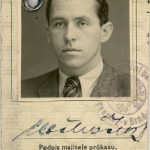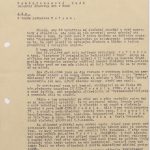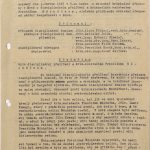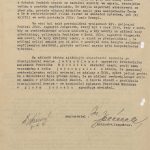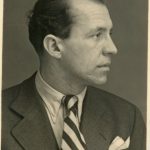Honoured against His Own Will
One of the characteristic features of the post-war period were the efforts of the security forces to track down and punish any collaborators of the Protectorate regime as they deserved. Many of these persons were awarded the so-called St. Wenceslas Eagle (the full name of this decoration was the Honorary Shield of the Protectorate of Bohemia and Moravia with the Eagle of St. Wenceslas) for their activities for the Protectorate. This decoration featured a black flaming eagle in a white field, referring to the tradition of St. Wenceslas. The decoration was awarded in several grades, especially towards the end of the war.
On May 8, 1947, František Měcháček, a criminal investigation assistant, one of the recipients of this award, addressed the Staff Council of the StB Regional Office in Brno. Měcháček asked for an investigation into the circumstances that led to his receiving this award. According to his words, he had already been “cleared” after being exempted from the award, but since the materials in question were not preserved in his file, he decided to request a new investigation of his case.
From 1937 František Měcháček worked as an office assistant at the Police Headquarters in Brno and in 1942, at his own request, he was assigned to the Department for the Prosecution of Fugitives from Work.
From Měcháček’s testimony it appears that on 22 December 1944 he was ordered to dress nicely and report to the Provincial Office in Brno the following day. When asked what would happen, he was told that he would find out tomorrow. The following day he arrived at the office, and it was only from a speech by a provincial official that he learned that he would be awarded. The award was conferred on him on the spot. Měcháček was overwhelmed by this “honour”.
Měcháček’s supervisor at the time stated in his testimony that he was asked to select someone from his department to be awarded the St. Wenceslas Eagle. He further adds that “none of the employees assigned to me worked in the interests of the Third Reich in such a way that I was really interested in harming them by awarding the eagle, I decided to select three employees from my department who were known most to sabotage the work and whom I came to believe that the awarding of the eagle to them in Czechoslovakia could not be held against them because of their unwavering national character and their negative attitude to work in favour of the former Third Reich.”
František Měcháček was included in this trio together with František Habermann and Jan Vavroušek. Since Habermann was known to be a communist and Vavroušek did not have a good reputation, it was decided to nominate Měcháček for the award. It was also known that he had tried to protect people from forced labour in Germany by giving false information, that he had procured personal documents for people hiding from the Gestapo, and that he had also drawn attention to the actions of the Protectorate police and Kripo, which were aimed at arresting Czech citizens. The fact that he was single also contributed to Měcháček’s distinction.
Despite the fact that the commission that investigated Měcháček’s case concluded that he was in no way a collaborator and that the award was given to him out of sheer necessity, complications continued to follow Měcháček in later years.
After he left the SNB in 1950, he applied for a position as a security officer at the Zbrojovka arms factory in Brno. He started there on 1 June 1950, but his appointment met with opposition from some of the senior officials of the plant and Měcháček was removed from the position a month later.
As this case proves, not all of the honourees were true collaborators. Particularly at lower levels, these awards were often given on a “rationed” basis and marked their recipients for many years.



